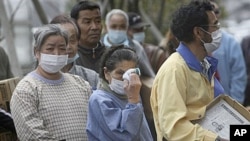Japan's government on Friday ordered Tokyo Electric Power Company to begin paying provisional compensation to nearly 50,000 families who lived near the damaged Fukushima-1 nuclear plant.
Industry Minister Banri Kaieda says he wants the company to quickly hand out the payments.
Kaieda says the money is meant to assist with short-term living expenses for those who had to quickly evacuate with only the most basic of necessities.
Tokyo Electric president Masataka Shimizu announced families within a radius of 30 kilometers from the nuclear plant will get one million yen - which is about $12,000 - while single-member households will received 75 percent of that amount.
Shimizu says beginning March 28 consultations for those with residences within the radiation evacuation zone will take place at a counseling center in Fukushima prefecture.
Fukushima's governor Yuhei Sato has been criticizing the utility and the government for their handling of the response to the nuclear disaster. He says the initial compensation payments are far short of what is needed.
The governor says this is just the beginning, noting the crisis has not ended. He says he will demand Tokyo Electric Power and the government pay the full price for disrupting the lives of the evacuees.
Officials say nearly 140,000 people who fled the radiation zone are still in shelters.
Radiation has contaminated crops and forced other farmers to abandon livestock. Fishermen have also been unable to sell their catches because of widespread fears about seawater contamination.
The nuclear power plant was severely damaged by the March 11 magnitude 9.0 earthquake and resulting tsunami. Since then, Tokyo Electric has been trying to regain control of the nuclear reactors, which lost critical cooling functions.
The plant, on Japan's northeastern Pacific coast, has been beset with fires, hydrogen explosions, radiation releases into the atmosphere and seawater and a buildup of toxic water on site.
| Discuss this story and others on VOA forums |




